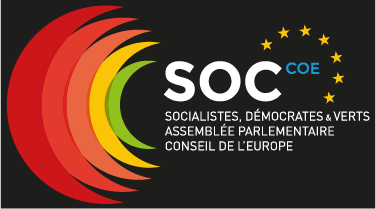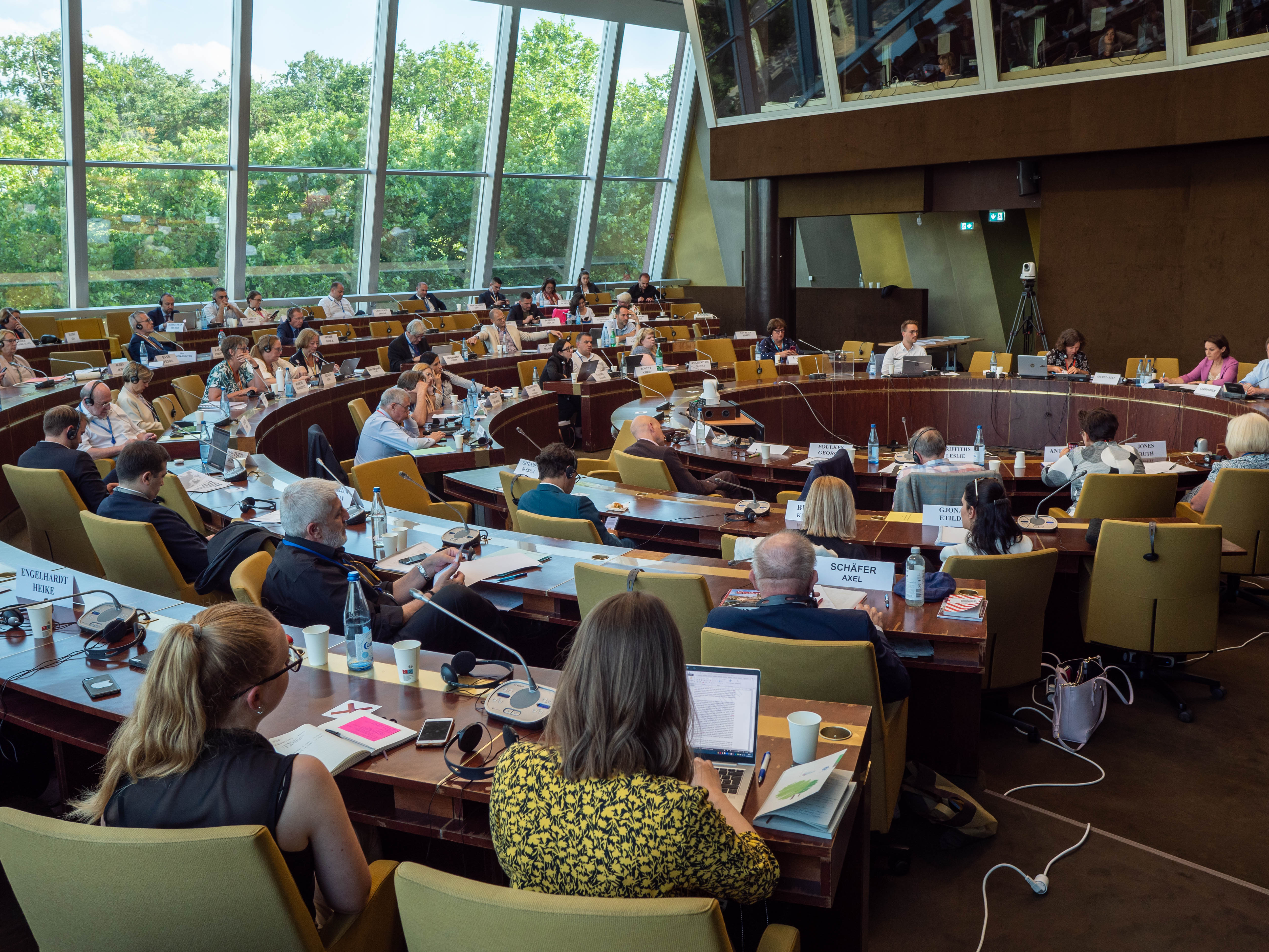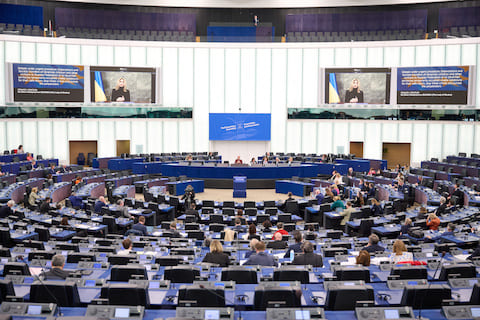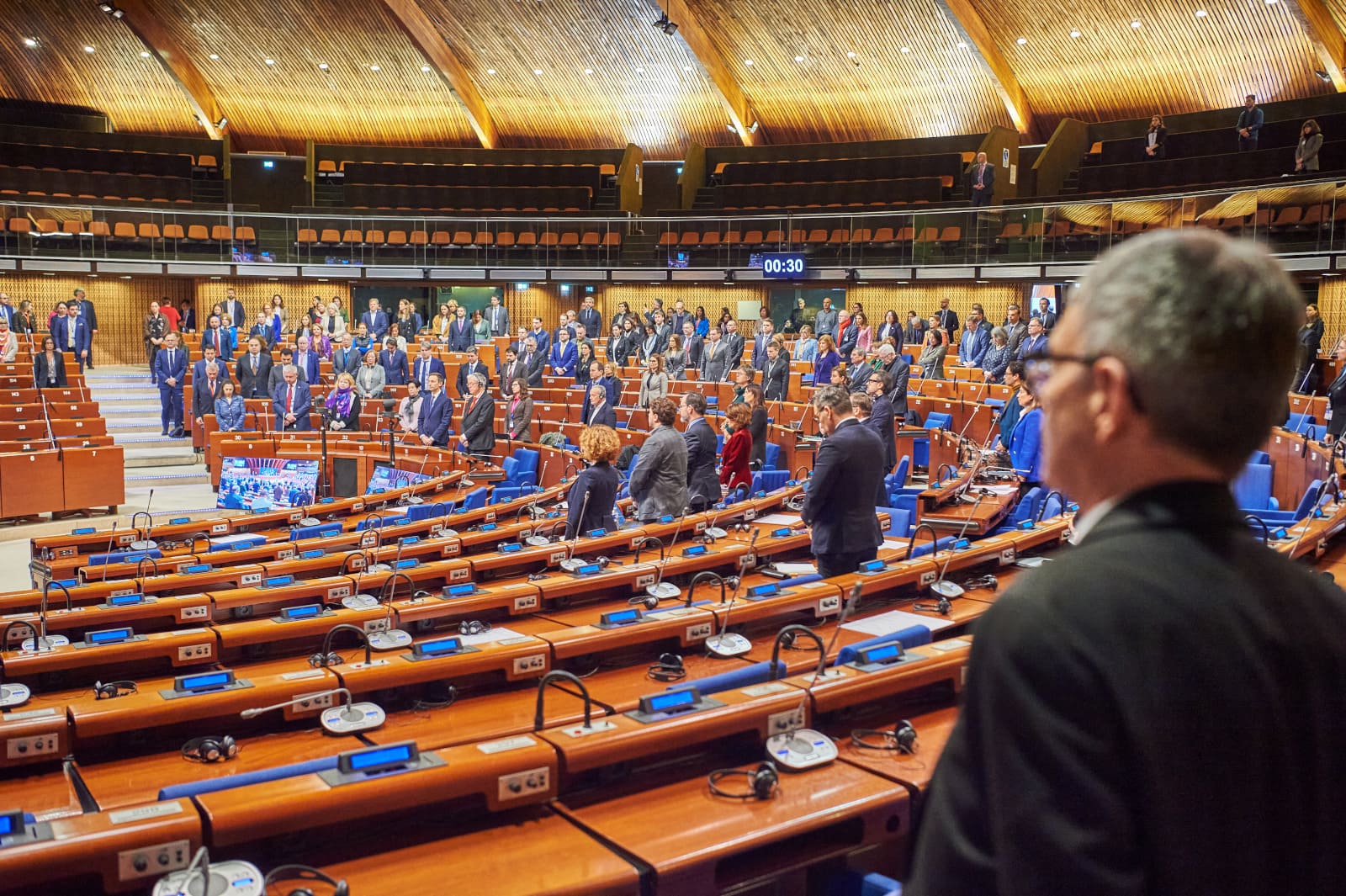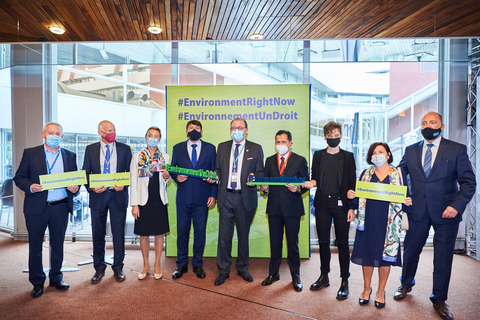
The Autumn 2021-part session focused on the environment
During the Autumn 2021 session, the Assembly awarded the Vaclav Havel prize, which rewards outstanding civil society action in the defence of Human rights in Europe and beyond. This session focused on the right to a heathy environment with seven reports, five from SOC group rapporteurs, and a high-level panel debate. Parliamentarians debated the socio-economic inequalities in Europe, stressing the need to strengthen social rights and adopted the report of Ms Selin Sayek Böke, first Vice President of the SOC Group, on this issue. The Plenary discussed as well the humanitarian consequences of the conflict between Armenia and Azerbaijan and the fight against so called “honour” crimes; and changed the rules of procedures of the Assembly for a better gender equality representation in the Assembly. It was a very fruitful part-session.
➢ Vaclav Havel Human Rights Prize
The Vaclav Havel human rights prize had three short listed candidates this year: Maria Kalesnikava, one of the opposition leaders in Belarus, the INGO Reporters sans frontiers that fights for the freedom of expression and information and Germain Rukuki, Human rights activist fighting against torture and death penalty in Burundi. The winner of this year is Maria Kalesnikava, for her struggle for freedom and her fight for civil and political liberties and fundamental rights. As she is detained since September 2020, her sister received the prize on her behalf, stressing the cases of all political prisoners in Belarus.
The SOC Group is very satisfied with this choice, symbolising the fight of the Belarussian people for democracy, freedom, and human rights, although the three nominees deserved all to be awarded for their fights.
➢ Socio-economic inequalities in Europe: time to restore social trust by strengthening social rights
The Assembly held a debate on socio-economic inequalities and listened the statement of Professor Jeffrey Sachs, Director of the United Nations Sustainable Development solutions network on this issue. As underlined by the rapporteur Selin Sayek Böke (SOC, Turkey) the socio-economic inequalities are intersectional and intergenerational, and as such require a comprehensive and holistic approach.
In the report adopted by a very large majority, the Assembly stressed the raise of the disparities in income, wealth, educational achievement, health status, nutrition, living conditions, occupations, social identity, and participation in society the Europe is seeing despite its prosperity. It called to revisit the structural root causes of inequalities and asked the members states to act for an effective implementation of the European Social Charter and the UN SDGs by tackling root causes of inequalities, guarantee fundamental rights, and better protect vulnerable people.
The SOC Group strongly supports the recommendations based on the report of Ms Selin SAYEK BÖKE underlining the need for and the importance of collective action in favour of the poorest countries and the most vulnerable population groups and stressing that States must invest in rebuilding the economy while strengthening their social system.
➢ Environment and human rights: right to a safe, healthy, and sustainable environment
The Assembly held joint debates on following seven reports covering a wide range of issues linked to environment and human rights: Anchoring the right to a health environment: need to enhanced action by the Council of Europe (Simon Moutquin ,SOC, Belgium); More participatory democracy to tackle climate change (George Papandreou, SOC, Greece); Addressing issues of criminal and civil liability in the context of climate change (Ziya Altunyaldiz, NR, Turkey); The climate crisis and the rule of law (Edite Estrela, SOC, Portugal); Combatting inequalities in the right to safe, healthy and clean environment (Edite Estrela, SOC, Portugal); Climate and migration (Pierre-Alain Fridez (SOC, Switzerland) and Research policies and environment protection (Olivier Becht, ALDE, France).
The Assembly recommends to the Committee of Ministers to draw up an additional protocol to the European Convention on Human rights, as well as one to the European Social Charter on the right to a safe, clean, healthy and sustainable environment. It proposes also to raise funds to help and protect the people forced to migrate by climate change. The Members want as well to promote the participation of the citizens in decision process.
A debate was held with a high-level panel on the same issues with the Council of Europe Secretary General Marija Pejcinovic, Hungarian President Janos Ader, the Speaker of the Italian Chamber of Deputies Roberto Fico, the Portuguese Deputy Environment Minister Eduardo Pinheiro, the European Court of Human Rights Judge Tim Eicke, and the Belgian climate and human rights activist Anuna de Wever van der Heyden.
The United Nations Secretary General Antonio Guterres sent a video message of support and His Holiness Pope Francis a letter of support.
The SOC group stressed the importance of the right to a healthy environment as part of the human rights and supported strongly the anchoring of the right to a healthy, clean, and sustainable environment into a legal framework.
➢ Humanitarian consequences of the conflict between Armenia and Azerbaijan/Nagorno-Karabakh
The humanitarian consequences of the conflict over Nagorno-Karabakh between Armenia and Azerbaijan have been tragic for both sides. The Assembly debated the issue, focusing on humanitarian consequences, including the dead, missing, and wounded, prisoners of war (POW)/alleged captives, allegations of crimes, war crimes, landmines and unexploded ordnance, displaced persons, border tensions, cultural heritage and hate speech.
The Assembly recalled the two countries their commitment, upon their accession to the Council of Europe in 2001, to use only peaceful means for settling the conflict, therefore the 6 weeks war in 2020 is a breach of these commitments and should be duly addressed by the Council of Europe.
The SOC Group agrees with the Assembly that the Council of Europe has an important role to help both Armenia and Azerbaijan tackle the humanitarian consequences of the conflict. The SOC Group calls the two countries for peace, appeal Azerbaijan to release the remaining POWs and Armenia to share the map with location of remaining landmines putting at risk civilian lives.
➢ Gender representation in the Parliamentary Assembly
The sharing of responsibilities in political and public decision making between women and men is an inherent element in a true and effective democracy, a matter of equity and justice. Therefore, the Assembly decided to amend its Rules of procedure in order to make the Assembly more representative in terms of gender equality at all levels: national delegations and political groups, and to achieve effective participation of women in decision making processes and in all parliamentary work. The report set a minimum threshold for the representation of the women in the delegations, which should be at least equal to the percentage of women in their national parliament, with a target of at least 30%.
The SOC Group strongly supports the improvement as well as the political objective to reach the participation of women and men with 40% minimum for each sex in the delegations of the Assembly by January 2026. The SOC Group welcomes warmly the decision to invite the Bureau to report on the implementation annually.
➢ Strengthening the fight against so-called “honour” crimes
The Members strongly condemn the so called “honour” crimes which are the manifestations of control and deeply rooted gender inequalities. They can take the form of murder, kidnapping, abduction, torture, mutilation, burning, forced suicide, and forced marriage. These crimes claim hundreds of victims from vulnerable groups, including women and LGBTQI+ communities, in Europe every year. The Istanbul convention clearly says that customs, tradition, culture, religion, or so-called “honour” cannot be put forward as justification for violence.
The Assembly calls on the members states to fully implement the Istanbul Convention, to provide protection and assistance to the victims and to run prevention campaign.
The SOC Group reaffirms with the Assembly that crimes of so-called “honour” are serious human rights violations which must be systematically and firmly condemned.
➢ Urgent debates
The Assembly held two urgent debates: one on the situation in Afghanistan: consequences for Europe and the region and the other one on Increased migration pressure on the borders of Latvia, Lithuania, and Poland with Belarus
The Members, concerned by the situation in Afghanistan with the return to power of the Taliban, stressed the risks for peace, stability and security for the country, the region and beyond. It is an imperative to address the humanitarian crisis. They called the members states of the Council of Europe to have a coordinated and concerted response. They are supporting the setting up of a specific, robust, and independent mandate of the UN Human rights Council to monitor the respect of the human rights in Afghanistan.
They stressed that operational engagement with the Taliban should be conditional upon respect of human rights and humanitarian law, rejection of terrorism, the formation of an inclusive and representative government. The Members States should take their moral and legal responsibilities regarding refugee protection. The Assembly calls on the Taliban to ensure respect of human rights, give access to girl to education and ensure women’s freedom of movement, access to work, healthcare, and sports.
The SOC group supported strongly the resolution drafted by Sir Tony Lloyd (SOC, UK).
The Members debated as well on the increased migration pressure on the borders of Latvia, Lithuania and Poland with Belarus.
They addressed the situation at the border of Latvia, Lithuania, and Poland with Belarus, denouncing the instrumentalization by Belarus of the asylum seekers and the pushbacks of the refugees by the governments of the three countries to Belarus. The Assembly calls the Belarussian authorities to stop the instrumentalization of the migrants, asylum seekers and refugees and condemn these hybrid attacks.
Members reiterate the obligations of all Council of Europe Member states to uphold human rights and humanitarian principles as well as refugee law and the right to seek asylum and ask them to ensure necessary humanitarian assistance, with special attention of vulnerable groups.
The SOC Group strongly supports these recommendations.
➢ Current affairs debate
"The Western Balkans between democratic challenges and European aspirations: what role for the Council of Europe?”
Following the intervention of Mr. Nikola Dimitrov, Deputy Prime Minister for European Affairs of North Macedonia, the Members held a debate, which was opened by Mr. George Papandreou (SOC, Greece). He stressed the importance of the EU integration and asked for the opening of the negotiations with Albania and North Macedonia and the relaunch of the enlargement process for the whole region. He underlined that the Assembly can make a major contribution if it renewed the hope for a European perspective for the Western Balkans, formulated recommendations to the authorities concerned, and further used its capacity and expertise for institutional reforms.

